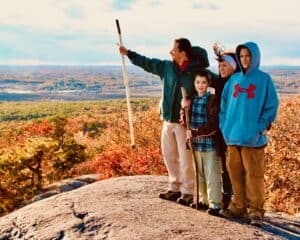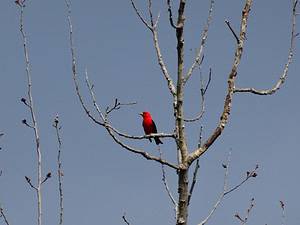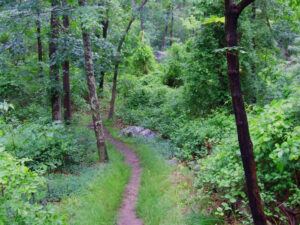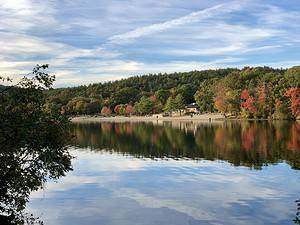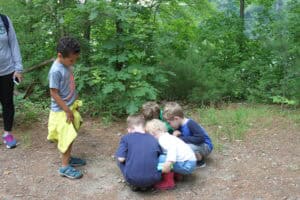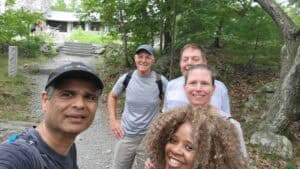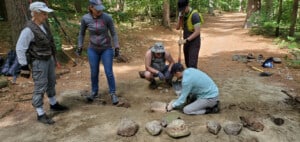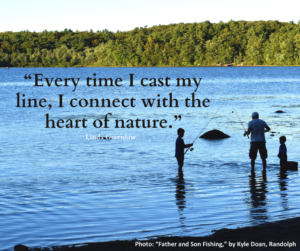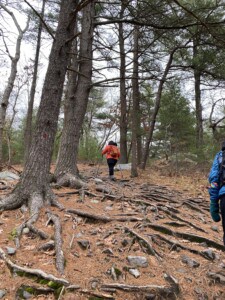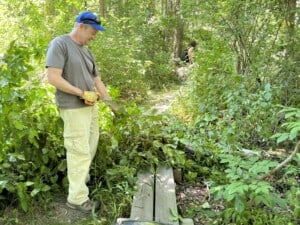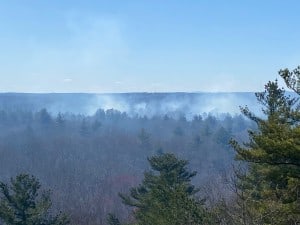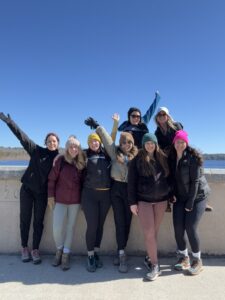When you take your kids to the Blue Hills, you are giving them more than just some fresh air and a beautiful view! According to Blue Hills A-Live guest, Kelly Majmudar, bringing young children into nature offers many benefits beyond the sights and sounds.
Kelly writes the blog Wike Baby and has always enjoyed the outdoors, participating in programs like “Nature and Me” with her elementary school class as well as bringing friends along for hikes up Great Blue Hill and she shares with us some of the ways your children will grow positively from being in nature and outdoors. Watch the full video here! And come April, you can bring your tots to the Peek a Blue Hikes, bi-weekly hikes that meet at Houghton’s Pond.
Peace and calm
One major benefit is that nature brings feelings of peacefulness and calming energy. “When my daughter was born, she was really fussy and colicky and I needed to get out of the house for myself. I found that she really calmed down a lot when we were outside” Kelly shares. She even cites research suggesting that children with ADHD benefit from time spent outside, in which more time spent in nature is associated with higher levels of concentration (Taylor & Kuo, 2009).
Physical Fitness
Children who spend more time outside have better physical fitness and health. Spending time outdoors, with increased time in the sun, is associated with higher levels of Vitamin D. Vitamin D is essential for promoting healthy bones and boosting the immune system while also reducing risk of diabetes and cancer. Kids who are outside also tend to move more and use a variety of muscles, allowing them to burn off energy and get stronger!
Time spent in nature is associated with improved thinking skills. Children with greater exposure to nature tend to score higher on tests of concentration and self-discipline. In fact, the more time spent in nature… the better the improvement (Taylor et al. 2002; Wells, 2000). Children are also more likely to have improved awareness, observational skills, and reasoning.

Improved Social Skills
Kids who spend time outdoors have improved social skills. These children show a reduction in antisocial behaviors that can be common during early and middle childhood. For example, playing outside is related to less bullying behavior, vandalism, and littering. More time outside actually promotes positive feelings about oneself as well as a child’s peers (Moore, 1996).
More Connected
Children will feel more connected to the Earth. Being connected with nature allows children to recognize their role in promoting and protecting environmental values (White, 2014). As Kelly puts it, “they’re more curious, they feel more like an identity to the Earth and we need people to care about the Earth. I feel like it’s a benefit to our global society to get our kids outside.”
Bringing children into nature has seemingly endless benefits. Are you going to plan to take your kids to the Blue Hills? Read Tips for Bringing Young Children on a Hike!
References
Moore, R. C. (1986). The power of nature: Orientations of girls and boys toward biotic and abiotic play settings on a reconstructed schoolyard. Children’s Environments Quarterly, 3(3), 52-69.
Taylor, A., & Kuo, F. E. (2009). Children with attention deficits concentrate better after walk in the park. Journal of attention disorders, 12(5), 402-409.
Taylor, A. F., Kuo, F. E., & Sullivan, W. C. (2002). Views of nature and self-discipline: Evidence from inner city children. Journal of environmental psychology, 22(1-2), 49-63.
Wells, N. M. (2000). At home with nature: Effects of “greenness” on children’s cognitive functioning. Environment and behavior, 32(6), 775-795.
White, R. (2004). Young children’s relationship with nature: Its importance to children’s development & the earth’s future. White Hutchinson Leisure & Learning Group, 1-9.

